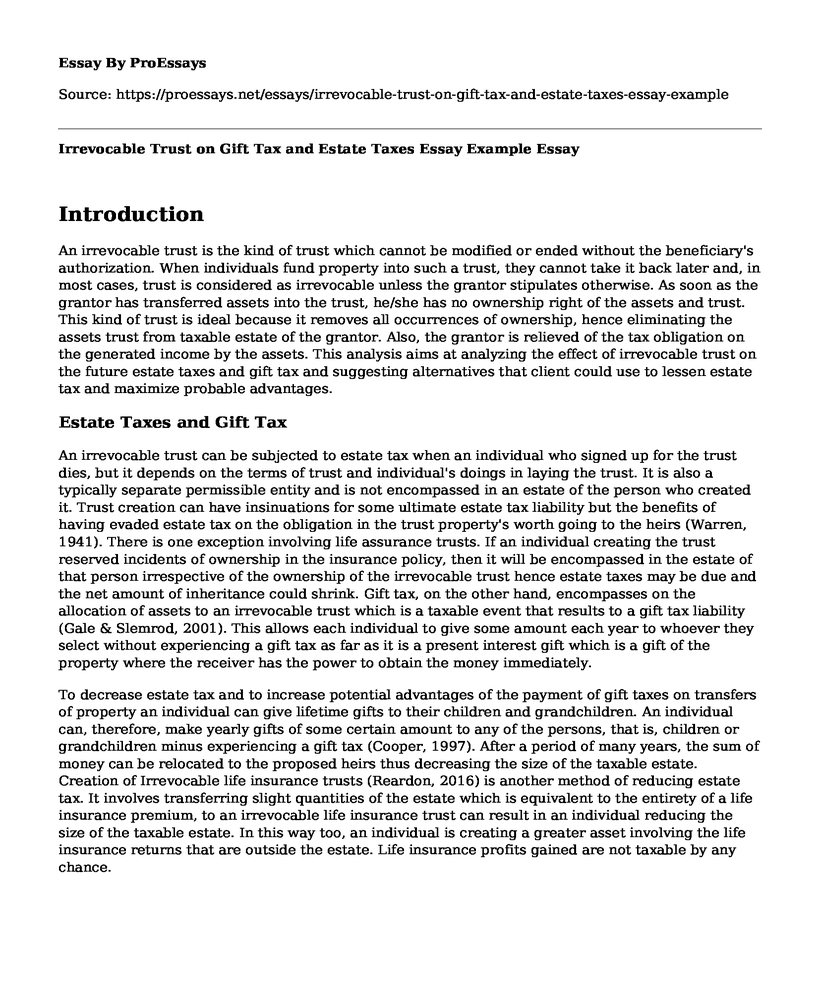Introduction
An irrevocable trust is the kind of trust which cannot be modified or ended without the beneficiary's authorization. When individuals fund property into such a trust, they cannot take it back later and, in most cases, trust is considered as irrevocable unless the grantor stipulates otherwise. As soon as the grantor has transferred assets into the trust, he/she has no ownership right of the assets and trust. This kind of trust is ideal because it removes all occurrences of ownership, hence eliminating the assets trust from taxable estate of the grantor. Also, the grantor is relieved of the tax obligation on the generated income by the assets. This analysis aims at analyzing the effect of irrevocable trust on the future estate taxes and gift tax and suggesting alternatives that client could use to lessen estate tax and maximize probable advantages.
Estate Taxes and Gift Tax
An irrevocable trust can be subjected to estate tax when an individual who signed up for the trust dies, but it depends on the terms of trust and individual's doings in laying the trust. It is also a typically separate permissible entity and is not encompassed in an estate of the person who created it. Trust creation can have insinuations for some ultimate estate tax liability but the benefits of having evaded estate tax on the obligation in the trust property's worth going to the heirs (Warren, 1941). There is one exception involving life assurance trusts. If an individual creating the trust reserved incidents of ownership in the insurance policy, then it will be encompassed in the estate of that person irrespective of the ownership of the irrevocable trust hence estate taxes may be due and the net amount of inheritance could shrink. Gift tax, on the other hand, encompasses on the allocation of assets to an irrevocable trust which is a taxable event that results to a gift tax liability (Gale & Slemrod, 2001). This allows each individual to give some amount each year to whoever they select without experiencing a gift tax as far as it is a present interest gift which is a gift of the property where the receiver has the power to obtain the money immediately.
To decrease estate tax and to increase potential advantages of the payment of gift taxes on transfers of property an individual can give lifetime gifts to their children and grandchildren. An individual can, therefore, make yearly gifts of some certain amount to any of the persons, that is, children or grandchildren minus experiencing a gift tax (Cooper, 1997). After a period of many years, the sum of money can be relocated to the proposed heirs thus decreasing the size of the taxable estate. Creation of Irrevocable life insurance trusts (Reardon, 2016) is another method of reducing estate tax. It involves transferring slight quantities of the estate which is equivalent to the entirety of a life insurance premium, to an irrevocable life insurance trust can result in an individual reducing the size of the taxable estate. In this way too, an individual is creating a greater asset involving the life insurance returns that are outside the estate. Life insurance profits gained are not taxable by any chance.
Conclusion
Based on the above, irrevocable trust is preferred because it removes all occurrences of ownership, hence eliminating the assets trust from taxable estate of the grantor. An irrevocable trust can be subjected to estate tax when an individual who signed up for the trust dies, but it depends on the terms of trust and individual's doings in laying the trust. Gift tax encompasses on the allocation of assets to an irrevocable trust that results to a gift tax liability. Irrevocable life insurance trusts reduce estate tax and the gained profits are not taxable.
References
Cooper, W. P. (1997). Irrevocable Life Insurance Trusts. Complete Law., 14, 4.
Gale, W. G., & Slemrod, J. B. (2001). Rethinking the estate and gift tax: overview (No. w8205). National Bureau of Economic Research.
Reardon, D. (2016). Do You Still Need an Irrevocable Trust for Life Insurance?. Journal of Financial Service Professionals, 70(1), 20-22.
Warren, W. C. (1941). Correlation of Gift and Estate Taxes. Harv. L. Rev., 55, 1.
Cite this page
Irrevocable Trust on Gift Tax and Estate Taxes Essay Example. (2022, Oct 23). Retrieved from https://proessays.net/essays/irrevocable-trust-on-gift-tax-and-estate-taxes-essay-example
If you are the original author of this essay and no longer wish to have it published on the ProEssays website, please click below to request its removal:
- Globalization Is Not Made in the West
- Research Paper on Tax Avoidance and Tax Evasion
- Annotated Bibliography on Development, Trade, and the WTO
- Mario Barrera: Colonial Labor System - Research Paper
- Paper Example on Windsor Family Financial Plan: Alastair & Wendy's Secure Future
- Paper Example on Comparing Capital Expenditure of Apple Inc. and Samsung
- Paper Example on Maximizing Employee Retention: Optimizing Institutional Knowledge for Success







